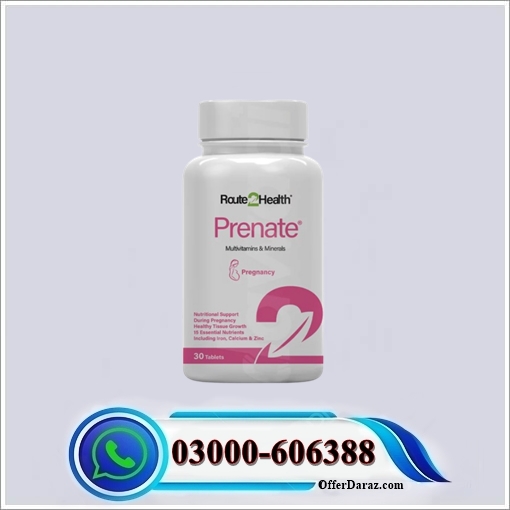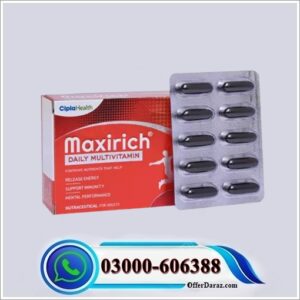Prenate Tablet Uses in Urdu
Prenate Tablet Uses in Urdu a type of prenatal supplement commonly prescribed to pregnant women. These tablets typically contain a combination of essential vitamins, minerals, and other nutrients that are important for the health of both the mother and the developing baby during pregnancy. The specific formulation may vary, but common ingredients found in prenatal tablets include folic acid, iron, calcium, vitamin D, vitamin C, vitamin B12, and omega-3 fatty acids.
The purpose of Prenate tablets is to help meet the increased nutritional needs of pregnant women, as pregnancy often requires higher intake levels of certain nutrients to support fetal growth and development, as well as to maintain the mother’s Health. Folic acid, for example, is crucial for preventing neural tube defects in the baby, while iron is important for preventing anemia in the mother and ensuring adequate oxygen supply to the fetus.
Pregnant women need to discuss their nutritional needs with their healthcare provider and follow their recommendations regarding prenatal supplements, including the appropriate dosage and duration of use.
Prenate Tablet Benefits:
- Nutritional Support: Prenate tablets provide essential vitamins, minerals, and nutrients that pregnant women need to support their own health and the healthy development of their baby. These nutrients play vital roles in various bodily functions and are particularly important during pregnancy.
- Prevention of Birth Defects: Prenate tablets often contain folic acid, which is crucial for preventing neural tube defects such as spina bifida and anencephaly. Adequate intake of folic acid before and during early pregnancy can significantly reduce the risk of these birth defects.
- Healthy Fetal Development: The combination of nutrients in Prenate tablets supports optimal fetal growth and development. For example, iron helps ensure proper oxygen supply to the fetus. Calcium supports the development of strong bones and teeth, and omega-3 fatty acids contribute to brain and eye development.
- Maternal Health: Prenate tablets can help prevent nutritional deficiencies in pregnant women. Reducing the risk of conditions such as anemia and osteoporosis. Adequate nutrition during pregnancy also supports the mother’s overall well-being and energy levels.
- Reduced Risk of Complications: Meeting nutritional needs through supplementation may help reduce the risk of certain pregnancy complications, such as preterm birth, low birth weight, and preeclampsia.
- Postpartum Recovery: Adequate nutrient intake during pregnancy can also support postpartum recovery. Including replenishing nutrient stores depleted during pregnancy and childbirth.
- Convenience: Prenate tablets are typically easy to take and provide a convenient way for pregnant women to ensure they are getting essential nutrients. Especially if dietary intake alone may not be sufficient.
It’s important for pregnant women to discuss their individual nutritional needs with their healthcare provider and follow their recommendations regarding prenatal supplementation, including the appropriate dosage and duration of use.
Prenate Tablet Side Effects:
- Constipation or Diarrhea: Iron, a common component of prenatal vitamins, can sometimes cause constipation in some individuals. Conversely, some people may experience diarrhea as a side effect. Drinking plenty of water and increasing dietary fiber intake can help manage these symptoms.
- Stomach Upset: Some individuals may experience stomach discomfort, bloating, or gas after taking Prenate tablets. Splitting the dosage throughout the day or taking the supplement with food may help minimize these symptoms.
- Allergic Reactions: In rare cases, individuals may be allergic to ingredients in Prenate tablets. Such as certain vitamins or minerals. Allergic reactions can vary in severity and may include symptoms like rash, itching, swelling, dizziness, or difficulty breathing. Seek immediate medical attention if you experience any signs of an allergic reaction.
- Metallic Taste: Iron supplements, which are commonly included in prenatal vitamins, can sometimes cause a metallic taste in the mouth. This side effect is typically harmless but can be bothersome for some individuals.
- Urinary Discoloration: Some prenatal vitamins may cause urine to appear darker in color. This is usually due to the presence of B vitamins, particularly vitamin B2 (riboflavin), and is not a cause for concern.
- Miscellaneous Symptoms: Other potential side effects may include headache, dizziness, fatigue, or changes in appetite. These side effects are generally mild and temporary but should be discussed with a healthcare provider if they persist or worsen.
It’s important to follow the recommended dosage and administration instructions provided by a healthcare provider when taking Prenate tablets or any other prenatal supplement. If you experience severe or persistent side effects, discontinue use and consult with your healthcare provider for further guidance.
Prenate Tablet Uses Use in Urdu:
- Prevention of Birth Defects: Prenate tablets often contain folic acid. Which is essential for preventing neural tube defects such as spina bifida and anencephaly. Adequate intake of folic acid before and during early pregnancy can significantly reduce the risk of these serious birth defects.
- Supporting Fetal Growth and Development: The combination of nutrients in Prenate tablets supports optimal fetal growth and development. For example, iron helps ensure proper oxygen supply to the fetus. Calcium supports the development of strong bones and teeth, and omega-3 fatty acids contribute to brain and eye development.
- Preventing Nutritional Deficiencies: Prenate tablets help prevent nutritional deficiencies in pregnant women. Reducing the risk of conditions such as anemia, osteoporosis, and other health complications associated with inadequate nutrient intake during pregnancy.
- Maternal Health: Adequate nutrition during pregnancy supports the overall health and well-being of the mother, including maintaining energy levels. Supporting immune function, and aiding in postpartum recovery.
- Reducing the Risk of Pregnancy Complications: Meeting nutritional needs through supplementation may help reduce the risk of certain pregnancy complications. Such as preterm birth, low birth weight, and preeclampsia.
- Convenience: Prenate tablets provide a convenient way for pregnant women to ensure they are getting essential nutrients. Especially if dietary intake alone may not be sufficient to meet increased pregnancy-related nutritional needs.
It’s important for pregnant women to discuss their individual nutritional needs with their healthcare provider and follow their recommendations regarding prenatal supplementation. Including the appropriate dosage and duration of use of Prenate tablets.





Reviews
There are no reviews yet.